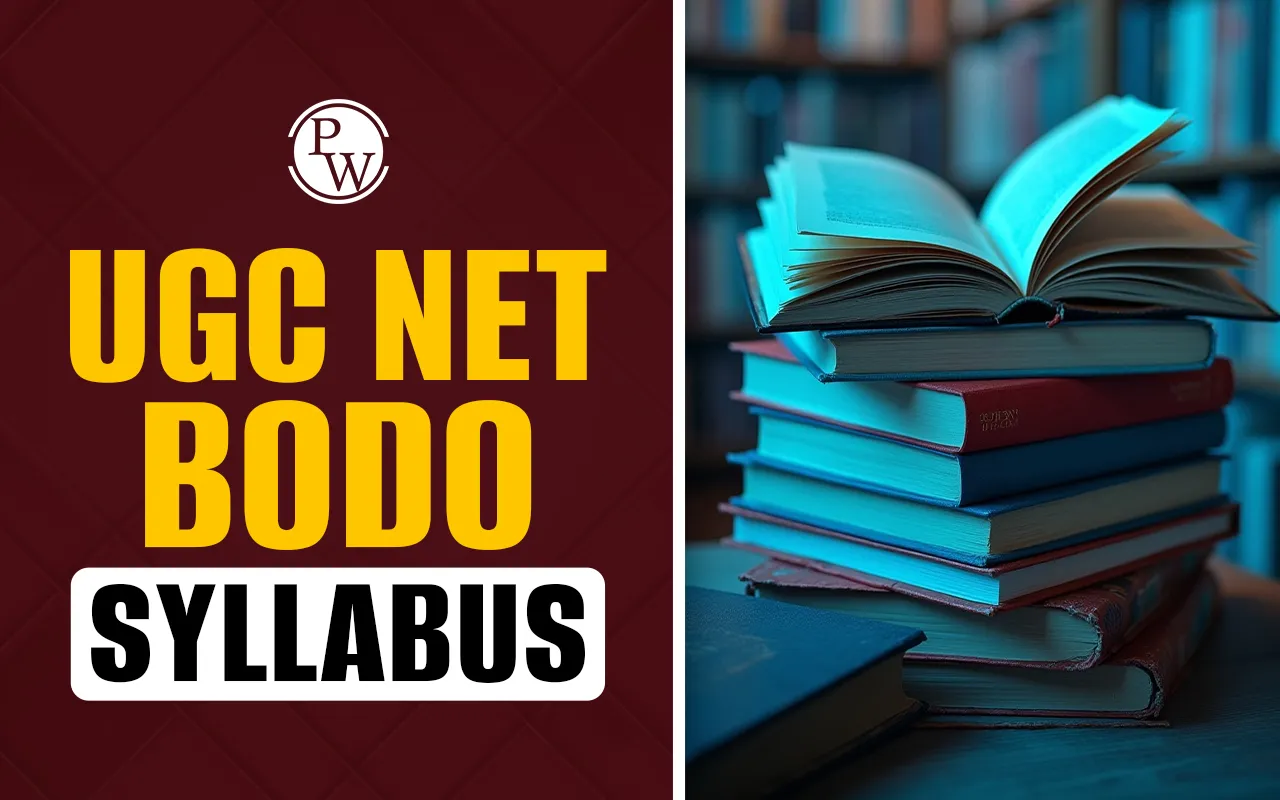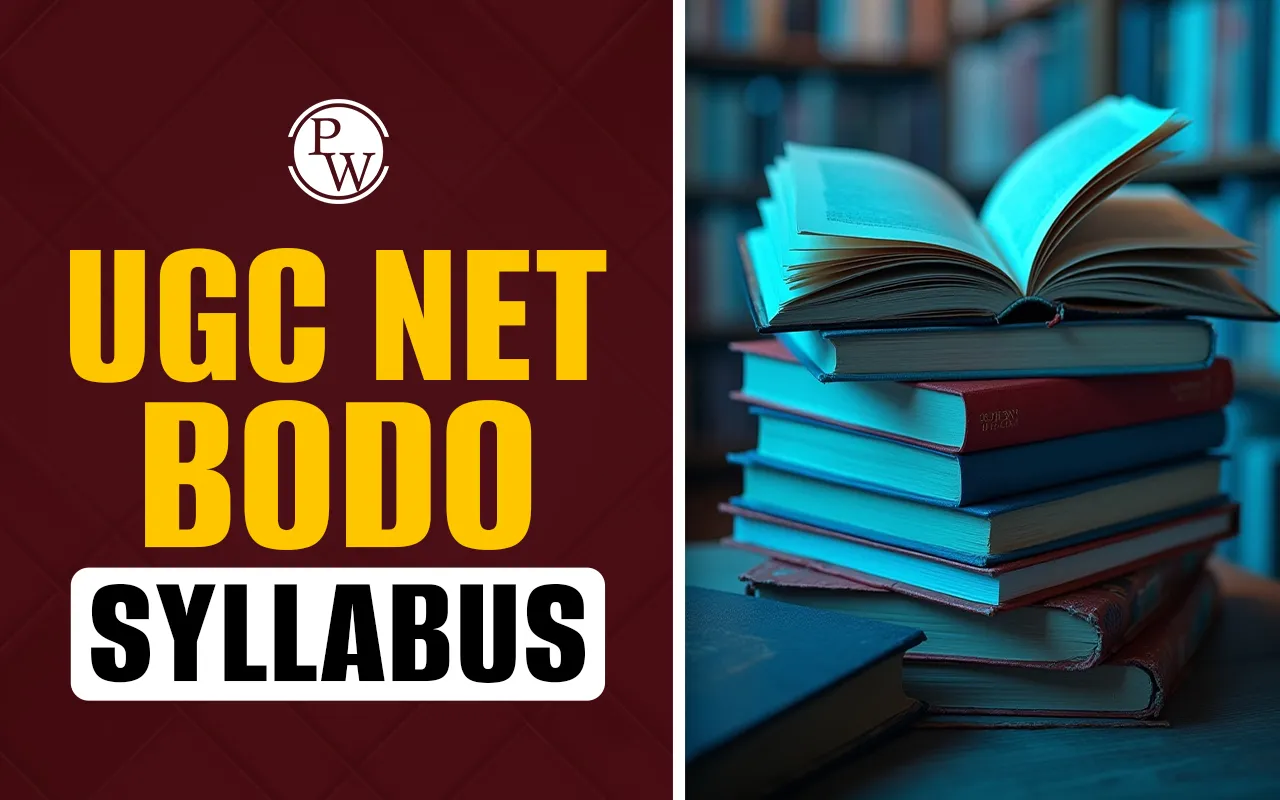

UGC NET Bodo Syllabus 2025 is an important aspect for effective preparation. The UGC NET Syllabus not only outlines the areas of study but also highlights the exam structure, marking scheme, and important topics that carry significant weight. Candidates preparing for the Bodo subject must carefully analyse the syllabus and align their preparation strategy accordingly.
The University Grants Commission National Eligibility Test (UGC NET) is one of the most prestigious national-level examinations conducted by the National Testing Agency (NTA) for candidates aspiring to become Assistant Professors or to qualify for Junior Research Fellowship (JRF). Among various subject papers offered, UGC NET Bodo plays a crucial role for candidates specialising in the Bodo language and literature.
Here, candidates can find the UGC NET Bodo Syllabus PDF link, syllabus details, exam pattern, marking scheme, and preparation tips.
UGC NET Bodo Syllabus 2025 Overview
The UGC NET Bodo syllabus is designed to test a candidate’s comprehensive understanding of the Bodo language, literature, culture, and related disciplines. It consists of two papers- Paper I and Paper II. Paper I evaluates general teaching and research aptitude, while Paper II is entirely based on the chosen subject, in this case, Bodo.
The syllabus covers a broad spectrum of topics ranging from the history of Bodo literature, linguistic features, grammar, folklore, cultural history, and contemporary issues in Bodo studies. Candidates can explore quick details about the UGC NET Bodo Syllabus:
| UGC NET Bodo Syllabus Overview | |
|---|---|
| Particulars | Details |
| Exam Name | UGC NET |
| Conducting Body | National Testing Agency (NTA) |
| Subject | Bodo |
| Paper Structure | Paper I General, Paper II Bodo subject-specific |
| Total papers | 2 (Paper I & II conducted in a single session) |
| Syllabus Coverage | Language, Literature, Folklore, Culture, Linguistics, and Contemporary Issues |
| Medium of paper | Bodo for Paper II, English or Hindi for Paper I |
| Mode of Exam | Computer-Based Test (CBT) |
| Official Language | Bodo (Question Paper) |
Note: This structured overview of the UGC NET Bodo Syllabus gives candidates a clear idea of the exam expectations. The official PDF link provides complete details of the subject syllabus for reference and study.
UGC NET Bodo Syllabus 2025 PDF Download (Official Link)
NTA provides the subject-wise UGC NET Bodo Syllabus in a downloadable PDF format. For UGC NET Bodo, the official syllabus is published in the Hindi version, covering all topics required for Paper II. Candidates can access the syllabus directly from the UGC NET official site.
Here is the direct link to download the UGC NET Bodo Syllabus PDF:
It is strongly recommended that candidates keep the PDF handy while preparing, as it provides the authentic and updated syllabus.
UGC NET Bodo Syllabus 2025 – Paper 1 & Paper 2 Details
The UGC NET Bodo syllabus for Paper II encompasses detailed study areas in language, literature, and culture. It is structured to test in-depth subject knowledge along with analytical and critical thinking skills.
The following key areas of the UGC NET Bodo Syllabus must be considered during exam preparation:
History of the Bodo Language and Literature - Development phases, ancient and modern traditions.
Bodo Grammar and Linguistics - Phonology, morphology, syntax, semantics.
Prose and Poetry in Bodo - Prominent writers, literary movements, and forms.
Drama and Fiction in Bodo - Study of major playwrights, narrative styles, and thematic concerns.
Bodo Folklore and Oral Traditions - Folk songs, myths, legends, and oral storytelling.
Cultural History - Evolution of Bodo culture, festivals, rituals, and socio-cultural practices.
Contemporary Bodo Literature - Post-independence writings, themes of identity, politics, and society.
Translation Studies in Bodo - Translations into and from Bodo, comparative studies with other languages.
Modern Literary Criticism - Critical approaches applied to Bodo texts.
Research Trends - Recent developments in Bodo language and literature studies.
Important Topics in UGC NET Bodo Syllabus 2025
Since the UGC NET Bodo Syllabus is vast, certain areas of the subject are considered high-weightage topics based on previous exam trends and expert analysis. Candidates must prioritise these frequently repeated topics while preparing for the upcoming examination. Generally, the following topics under the official syllabus for the Bodo subject are based on past years’ exam trends:
| Important Topics in UGC NET Bodo Syallbus | |
|---|---|
| Major Areas | Sub-Topics to Focus On |
| History of Bodo Literature | Early oral traditions, Post-independence Bodo writings |
| Bodo Linguistics | Grammar structure, phonetics, and morphological analysis |
| Prose and Poetry | Works of renowned poets and prose writers |
| Bodo Drama and Fiction | Modern narrative styles, plays addressing cultural identity |
| Folklore and Oral Traditions | Folk songs, mythological stories, and oral literature forms |
| Contemporary Literature | Political identity, tribal consciousness, and globalisation impacts |
| Translation and Comparative Lit. | Influence of Assamese, Hindi, and English translations |
| Cultural Studies | Festivals, rituals, traditions, and their literary representation |
Note: Candidates should be aware that the above-specified topics have been included in previous years’ examinations. By emphasising these topics, candidates can focus on areas most likely to appear in the UGC NET 2025 Bodo exam.
UGC NET Bodo Exam Pattern 2025 & Marking Scheme (Updated by NTA)
Understanding the UGC NET Bodo Exam Pattern is as important as knowing the syllabus during examination preparation. UGC NET follows a two-paper structure conducted in a single session through Computer-Based Testing (CBT).
Further, candidates can take reference from the following details present in the UGC NET Bodo Exam Pattern:
-
Paper I contains General, common to all candidates.
-
Paper II contains Subject-specific (Bodo) topics.
-
Total Marks: 300
-
No Negative Marking: Candidates are awarded marks for correct answers only. There is no negative marking in the UGC NET examination.
From here, candidates can get an idea about the UGC NET Bodo exam pattern and marking scheme:
| UGC NET Bodo Exam Pattern | ||||
|---|---|---|---|---|
| Paper | No. of Questions | Total Marks | Duration | Nature of Questions |
| Paper I | 50 | 100 | 3 hours (combined for both papers) | General Aptitude (Teaching, Research, Reasoning, Comprehension, ICT, etc.) |
| Paper II | 100 | 200 | Included in 3 hours | Subject-specific (Bodo Language & Literature) |
| Total | 150 | 300 | 3 hours | Multiple Choice Questions (MCQs) |
Learning the UGC NET Bodo Marking Scheme can help candidates with their mental preparation for the actual examination:
-
Each correct answer carries 2 marks.
-
No marks deducted for incorrect answers.
-
Candidates must attempt all questions as there is no penalty for wrong attempts.
This structure allows candidates to maximise scores with strategic attempts.
UGC NET Bodo Preparation Tips for 2025 Exam
Preparing for the UGC NET exam 2025 for the Bodo subject requires a well-planned strategy since the syllabus is comprehensive and demands conceptual clarity. Here are some practical preparation tips:
Understand the Syllabus Thoroughly: Download the official UGC NET Bodo syllabus PDF file and break it into smaller study modules to simplify the subject topics.
Make Topic-Wise Notes: Maintain short notes on important themes, literary movements, and authors.
Focus on Previous Year Papers: Analyse previous year’s UGC NET Bodo question papers to identify recurring topics.
Practice Mock Tests: Regular mock tests will improve time management and accuracy.
Balance Paper I and Paper II topics: While Bodo (Paper II) is crucial, Paper I also carries 100 marks and can help improve the overall score.
Revise Regularly Weekly revision ensures retention of key facts and concepts.
Refer to Standard Books: Use authentic Bodo literature books and linguistic references recommended by experts.
Stay Updated: Read about contemporary literary debates, cultural issues, and recent publications in Bodo.
These strategies, if followed consistently, can enhance the performance of students in the UGC NET 2025 Bodo exam.
